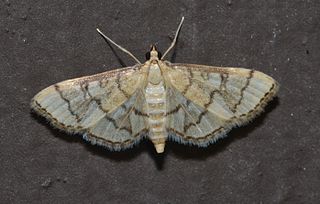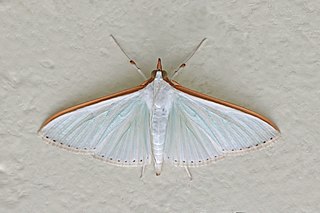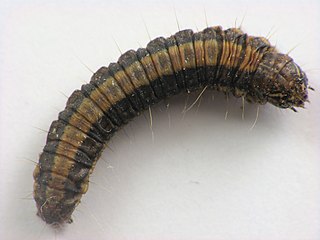| Anarmodia | |
|---|---|
| Scientific classification | |
| Kingdom: | Animalia |
| Phylum: | Arthropoda |
| Class: | Insecta |
| Order: | Lepidoptera |
| Family: | Crambidae |
| Tribe: | Margaroniini |
| Genus: | Anarmodia Lederer, 1863 [1] |
| Synonyms | |
| |
| Anarmodia | |
|---|---|
| Scientific classification | |
| Kingdom: | Animalia |
| Phylum: | Arthropoda |
| Class: | Insecta |
| Order: | Lepidoptera |
| Family: | Crambidae |
| Tribe: | Margaroniini |
| Genus: | Anarmodia Lederer, 1863 [1] |
| Synonyms | |
| |

Spilomelinae is a very species-rich subfamily of the lepidopteran family Crambidae, the crambid snout moths. With 4,132 described species in 340 genera worldwide, it is the most speciose group among pyraloids.

Omiodes is a moth genus in the family Crambidae. Several species are endemic to Hawaii.

Anania is a genus of moths of the family Crambidae described by Jacob Hübner in 1823.

Blepharomastix is a genus of moths of the family Crambidae described by Julius Lederer in 1863.

Cliniodes is a genus of moths of the family Crambidae described by Achille Guenée in 1854.

Diaphania is a genus of moths of the family Crambidae.

Dichocrocis is a genus of moths of the family Crambidae. The genus was described by Julius Lederer in 1863.

Glyphodes is a genus of moths of the family Crambidae described by Achille Guenée in 1854.

Herpetogramma is a genus of moths of the family Crambidae described by Julius Lederer in 1863. It currently comprises 106 species and is found in North America, Eurasia, Australia, New Zealand, Central and South America. Of the few species where host plants are known, the larvae mostly feed on grasses.
Megastes is a genus of moths of the family Crambidae.

Pyrausta is a speciose genus of moths of the family Crambidae. The genus was erected by Franz von Paula Schrank in 1802.

Phostria is a genus of moths of the family Crambidae.

Polygrammodes is a genus of moths of the family Crambidae.

Syllepte is a genus of moths of the family Crambidae.
Salbia is a genus of moths of the family Crambidae described by Achille Guenée in 1854.

Eriopyga is a genus of moths of the family Noctuidae. The genus was erected by Achille Guenée in 1852.

Leucania is a genus of moths of the family Noctuidae first described by Ferdinand Ochsenheimer in 1816.

Desmia is a genus of moths of the family Crambidae. The genus was erected by John O. Westwood in 1832.

The Epipaschiinae are a subfamily of snout moths. Almost 600 species are known today, which are found mainly in the tropics and subtropics. Some occur in temperate regions, but the subfamily is apparently completely absent from Europe, at least as native species. A few Epipaschiinae are crop pests that may occasionally become economically significant.

Margaroniini is a tribe of the species-rich subfamily Spilomelinae in the pyraloid moth family Crambidae. The tribe was erected by Charles Swinhoe and Everard Charles Cotes in 1889.
| This Margaroniini-related article is a stub. You can help Wikipedia by expanding it. |